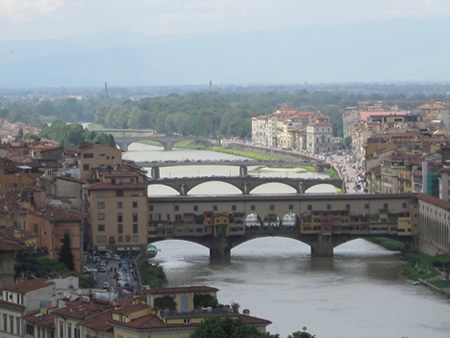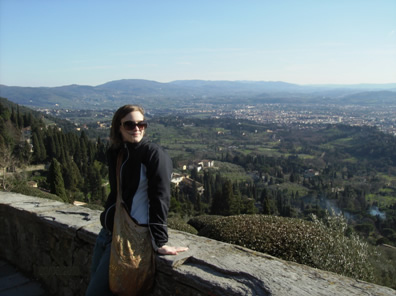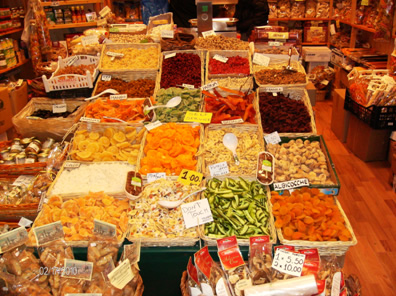Living La Vita Fiorentina: One Spring in Florence, Italy
Transformations During a Semester Studying Abroad
Article and photos by Gillian Gurish

|
|
The Ponte Vecchio from Piazzale Michelangelo from a hill above the Arno River.
|
During the spring semester of my junior year in college, I studied abroad in Florence with Academic Programs International. It is no exaggeration to say that my experience changed my life. Since returning to this side of the Atlantic, I have become a passionate advocate for study abroad because I think that, as a college student who is still trying to figure out who she is and what she wants to do, the experience of being forced outside of one’s comfort zone is one of the most important and beneficial actions a person can do. The sense of independence, liberation, and self-confidence I returned is priceless, and I wish every person could have such opportunities to create their own mind-opening experiences.
Finding Florence
I always knew I would study abroad for a semester. My goal is to be fluent in a second language. Living in a country and immersing myself in the language was essential. As I had chosen to study Spanish in high school and continued to do so in college, going to Spain seemed like a no-brainer. I had been there before and had my heart set on returning to Toledo, the quietly serene town with the sword factory I visited when I was 12. However, as I began my research, I discovered very few options for an English major/music minor to study in Spanish and take classes relevant to my major. I found plenty of language programs but very few — if any — programs that offered liberal arts classes that could count toward my degree. So, I re-evaluated my priorities and discovered three goals to emphasize going forward:
-
A destination where the native language is not English, and I would have the opportunity to practice a second language.
-
The ability to take classes in subjects that my small liberal arts college could not offer while also allowing me to gain credit hours.
-
A town or small city. I am not a city girl.
I chose Italy for two reasons: I had been there before, loved it, and knew that the language was reasonably similar to Spanish. Florence immediately came to mind as it was a smaller city than Rome. Yet, there were many different programs to be found. I narrowed my choices to Academic Programs International (API) and Study Abroad Italy (SAI). The cost to participate in their programs was comparable, and their course offerings were extensive. I had found the perfect marriage of a small city, a foreign language, and courses. I ultimately chose API because of the course offerings; at Scuola Lorenzo de Medici, I could take a cooking course, which was, at the time, a growing interest of mine, and a course in music history that would complete my music minor. They had me at ciao.

|
|
The author is in Fiesole, a small village on a hill overlooking Florence. |
Enjoy: You Work Hard For The Experience!
The paperwork was an essential part of my decision to go with a program instead of trying direct enrollment. Most programs will help you with housing in your host city, class enrollment at the host institution, and the visa process, which can be complicated and confusing. The API program in Florence houses its students in apartments together. They aim to make compatible roommates match based on information the applicant provides in the program application. I created my course schedule as a part of the application. An important thing to be aware of as you begin filling out paperwork is that you will most likely need to get your courses approved well before your departure if you would like to receive credit for these classes. This meant obtaining a syllabus for each course I planned to take and getting it approved by the chair of whichever department that course fell under at my college. Different schools have different policies dictating how to receive credit for courses taken abroad, so the best place to check is at the study abroad office on your campus or working with your study abroad advisor. My advisor also helped me obtain the form my college required for my study abroad program, which recognized all the courses I would take abroad as courses approved by the college.
The visa process depends upon the country in which you plan to study. As a country within the Schengen area, Italy requires travelers staying in the country for longer than 90 days to obtain a Schengen Visa. API has an agreement with the Miami consulate that allows them to take the paperwork and passports of students who live within the area and obtain visas for them. Though I am from Massachusetts, I go to school in South Carolina. The Miami Consulate is the Italian Consulate for most of the southeast. My residence in that region allowed me to send all my paperwork and passport to API instead of forcing me to travel to Miami to obtain my visa personally. Please start the visa application process as early as you can! The sooner that phase ends, the sooner the fun part can begin.
Andiamo!
I arrived at the Amerigo Vespucci Airport in the afternoon of a day in late January. I was tired, jet-lagged, and hungry but already feeling empowered. I was here. I had made it through the Frankfurt airport in Germany without a hitch and with enough time to board the next and final flight to Firenze (Florence).
After breathing a sigh of relief that both of my checked bags appeared on the conveyor belt in baggage claim, along with 40-odd other American students bound setting off to Florence, I met the API Florence on-site staff holding signs and smiles. They led us to a bus that would take us to a hotel where we would stay for the first two days of orientation before we moved into our apartments. After a presentation in one of the hotel conference rooms on the basics of Italian culture, 200 students and I followed the staff for an exquisite dinner. I met my roommates-to-be, ate my heart out, and returned to the massive hotel bed.
And then it hit me. The nerves and the fear all came crashing down on my head that second day. I did not know what I was doing in a strange city with all these strange people who all seemed to know each other. I could not get my cell phone to work. What had I done?
A Taste of Empowerment in Florence
After moving into the apartments, beginning my classes, and settling in Florence, where I was attempting to feel at “home,” I started to see what I had done. I had decided to move across an ocean, entirely alone, to a new country with a language. I struggled to get my tongue around and live there for three and a half months. Nothing is more empowering than knowing that you can do all that and not only live — but thrive.
Little by little, I became thoroughly steeped in Tuscan and Florentine culture. I learned to make coffee with a “Moka,” the Italian household staple coffeemaker. I shopped at the Mercato Centrale (“Central Market”). This historic open-air market sells everything from fresh seasonal apples and artichokes to dried mushrooms, from raw almonds to Nutella, from fresh bread to raw cow stomach. It terrified me at first — the confrontation with the vendor, biting my lip as I tried to summon the correct Italian words to say, “I would like a bunch of spinach, please.” (Vorrei degli spinaci, per favore.) But I kept going back. I was determined to master market shopping, something quintessentially Italian, and no language barrier would keep me from getting the best pears I’d ever tasted. I still miss them.

|
|
A huge variety of dried fruits in a Florence market stall. The key to eating on a budget in a city brimming with tourists is to find markets off the beaten path and to cook. |
Aside from cultural immersion, the market was also one of the best ways to save money on food. I could easily walk out with about a week’s worth of produce for just four or five Euros while getting in some language practice and meeting people. Although I ate out several times a week, living in an apartment with a kitchen saved me a lot of money. I cooked my own meals frequently.
Because of the rise of supermarket chains in Italy and the difficulty of driving to the center of Florence, the Mercato Centrale has unfortunately become more of a tourist attraction than a gathering place for locals. Hungry travelers with large cameras and even larger hats frequent the market in group tours, snapping pictures and buying cheap bags of colored dried pasta for souvenirs. I spoke with a vendor whose family had worked in the market for generations, and he commented grimly on the increase in tourists and the decrease in local customers. One of my most critical cultural realizations happened in the market: I went to the same stall at least once a week. The vendor was a small woman with hair that matched her leathery, tanned skin tone. She talked quickly, smiled infrequently, and worked briskly. During the first few weeks of patronage, she barely spoke to me and maintained the same brusque and impersonal expression. About a month and several dozen yellow apple purchases later, I showed up as always for my produce for the week. She recognized me, and that cold face relaxed into a friendly expression. She picked up one of the ripe melons barely coming into season. She sliced it deftly with a knife in her pocket and offered me a bite. It was the juiciest, most flavorful bite of fruit I had ever tasted. And I understood. I was no longer an American tourist, only there to take pictures and see the sights. I became a local at that moment, doing her weekly food shopping. It felt like the city of Florence had finally opened up to me, shaken my hand, and welcomed me in.
Get Going!
I returned home a very different person than the one who got on that plane in late January. I had proven that I could do anything if I set my mind to it — whether living in a new country, learning the ways of a different culture, or just making something happen. Whenever I felt restless, bored, or homesick in Florence, I got up and walked. I got lost in those tiny cobblestoned streets barely wide enough for a couple of Vespas, but I always found my way back.
Florence taught me so much, but the most important lessons I brought home were the ones I learned about myself. Taking a train ride to Arezzo, a small city in Tuscany, and spending the day there gave me self-confidence that I could do anything if I set my mind to it. Shopping in the market taught me that I can immerse myself in a culture without fear of rejection. Getting lost on my many walks around the city gave me a sense of adventure I had never had before. The courses that I was able to take about food and cooking led me to the decision to go to culinary school.
So what are you waiting for?!
The first thing to do is figure out your priorities. Do you want to study in a small town or a big city? Is language a priority for you? Do you want to live with other American students or a local family in a homestay? Are you more interested in a volunteer abroad trip or an internship? Once you have determined your priorities, start looking into locations and programs. Your school’s study abroad office is a great place to start. Your school may already have programs set in place with universities abroad, or maybe you are looking into direct enrollment. There are countless options out there, and there is one for you. When you have made a decision, start looking into financial aid options. I could apply for and receive scholarship funding from my college, which helped pay for part of the cost. There are also tons of external scholarships out there.
Before you go, be sure to research your host country and city. What are the local customs? What do they eat? A fantastic way to do so is by finding blogs — many students blog about their experiences while there, and it is a way of getting a taste of their daily life! It’s also a great way to record your experiences as they happen and share them with your friends and family. I started my blog in Florence, and it was one of the best things I did. I can relive every day with the click of a mouse!
Gillian Gurish is a senior English major/Music minor from Dedham, MA at Converse College in Spartanburg, SC. I studied abroad in Florence, Italy with API during the spring semester of my junior year.
|
